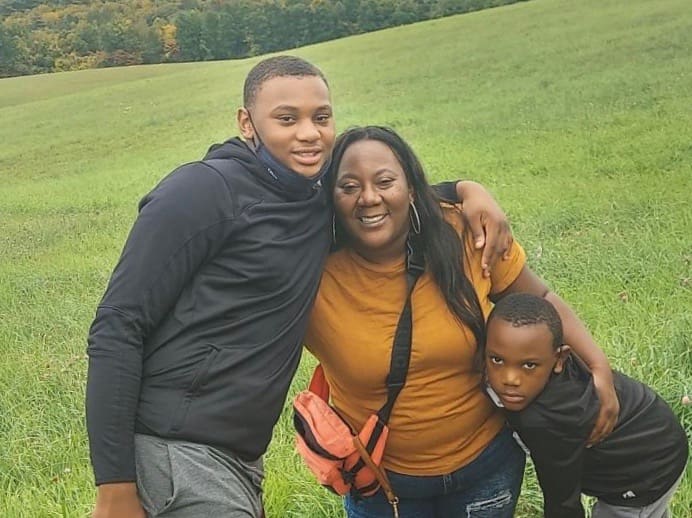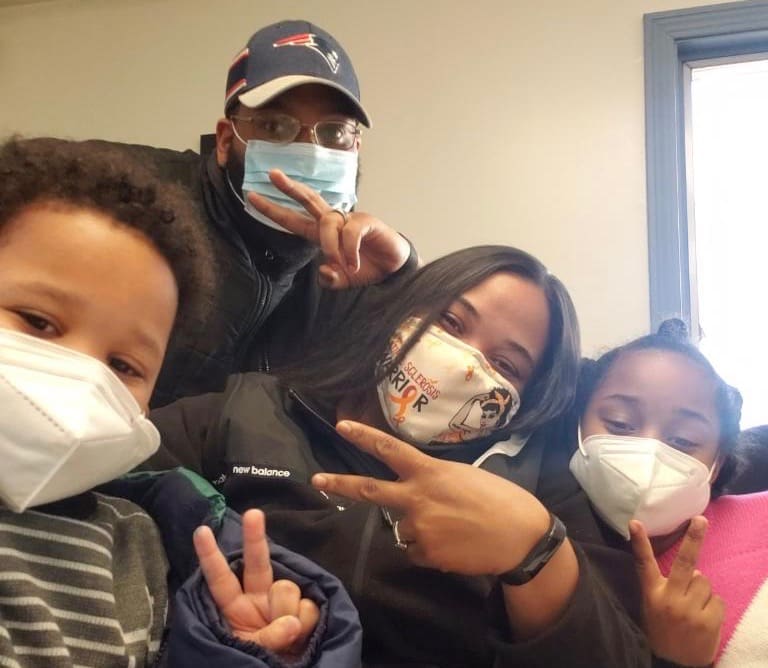Stories
Deonne
Deonne shares her story of trying to navigate the cliff effect in the video. She shared her story during an Economic Pathways Coalition Meeting in November 2021.

Shalonda
- Single, working mom to two boys ages 15 and 9
- Family Service Clinician at Square One
- Working on her graduate degree
“I used to make $39,000 at my most recent job. I just accepted a promotion, knowing full well that I’m going to lose housing. We’re going to have to move out and hunt for an apartment we can afford. I’ve been avoiding promotions for so long knowing that I would lose all this support, but I’m tired of it now.
For years I’ve had to choose between job opportunities and buying groceries.
I couldn’t save money. I didn’t grow because of it.”

Mariangeliz
- Special Needs Teacher Assistant
- Mother of four
“I left my job as a patient care technician in order to take care of my daughter. During this time I was on full welfare. I wanted to work again but was scared to do so because I knew that if I went back to full-time work I could lose a lot of help for my daughter. Then I did. I got a job as a paraprofessional working 1-on-1 with children with autism. I lost half of the aid for my daughter. Six months later we stopped receiving any SNAP. Now I’m off all assistance except housing. During COVID I have received SNAP for my kids, which has been really helpful, but I know that will not stay forever.”

Sarah Muil
- Director of a nursery school in Stockbridge, MA
- Mother of four
- Graduate student at Boston College for Educational leadership and Policy
“When I saw the presentation of the Cliff Effect it blew my mind because that was me at one time when I was a single mom of 2 young children, trying to make ends meet, and really struggling. I was grateful for the support of public assistance but then again it was also a hindrance sometimes because as I said maybe I could get a housing voucher or a voucher for childcare, but if I made a little more money (even .10c more per hour!), I might lose those services, or my health care was threatened because of it. We had MassHealth at the time.
If I made more money MassHealth would deny us and then I would have to pay an exorbitant amount of money for a family plan through my employer.
So, I would take more money out of my pocket trying to live and work and feed my children and have a car to get to and from work because we have no transportation system that is healthy in Western Mass. I was so happy to see that there is constant work being done around that.
I have been in education for 25 years. I started when I was a teenager working in summer camps. I’ve worked in the private sector, the public sector, and with nonprofits. So, I’ve really run the gamut and seen all the diverse geographic and demographic people that I could possibly see. I really feel passionate that the educators themselves should feel valued and feel that they can make a livable wage and not have to work two or three jobs to live and support their families.”

Tracye Whitfield
- City Counselor in Springfield, MA
“The earliest memory that I have of the Cliff Effect… was when I started working for Mass Mutual and I was making $12.50 an hour. My daughter was in kindergarten but my son was a baby and I had to get daycare for him.
I remember that my daycare went from being free to being $200 a week.
I didn’t have $200 a week for daycare. I was making $12.50 an hour, plus my bills and taking care of my children.
I was really upset one day and I was crying when I was dropping him off at daycare. The day care provider asked me what was wrong and I explained to her that I had to find somewhere else for him to go because I couldn’t afford to pay her $200 a week.
She said, “Let me work on something.” She searched around and ended up having some United Way vouchers. I was blessed because she helped me get those United Way vouchers so that I only had to pay $50 a week for daycare instead of $200 a week.
I also remember everything dropping. I was making a little bit more while all the benefits were going away. Immediately your income changes and in two weeks everything else does, too. We didn’t have a gap of time to see how things turned out. You just have to cut back. I remember sitting my daughter down and telling her we couldn’t do a lot of things. We made it work for a time until my income increased over the years.
It’s difficult because you make a couple dollars more an hour and your benefits are cut. You’re making less money than you were when you were on assistance so I can understand why people would go back to not working and just getting assistance. I remember crying.
If I hadn’t cried that day in the day-care and gotten those extra United Way vouchers I probably would have quit my job to take care of my son. I didn’t know what I was going to do. “

Shayvonne
“No one warned me about the cliff effect. I went from $300-$400 on SNAP to nothing. If I had been only Spanish-speaking I would have been hopeless navigating the system. I’ve been on the childcare voucher since I was 26.
Now I’m 34 and I don’t think I’m ever going to get off. It’s the whole cycle of craziness because you’re pulling people on and off subsidies and they can and can’t afford to just live.
This month I was applying to the job I have now and another job. I turned down the other job, a six-figure job, because it would screw up everything. We would have lost the childcare voucher. How many people would get the job of their dreams, if they knew that their child care would be taken care of? I remember when I used to come to the community cookouts my organization used to do because that free hamburger or hot dog would be a meal we could count on that day to cut expenses in order to afford the weekly child care rate.
This legislation is so important to me. Finally someone wants to know what we go through as low to moderate income, bilingual, people of color.”
Mary*
name changed for confidentiality
- WIC Lactation Consultant
- Mother of two
“I used to work as a phlebotomist and I lost my job during the pandemic. During the pandemic I found myself with both my daughters home and my husband having to work more because they needed more help at his job. We did that for a while, but when I found the opportunity to take an IT training remotely I thought I could do it with both my girls at home. The kindergartener was fine, but the toddler wanted my constant attention. I felt that I was going towards a breaking point.
I felt that I was going towards a breaking point.
That’s when I realized I needed to keep asking for childcare. That’s when I registered her for full day care at Headstart. I was at the top of the waitlist but every time there was an opening, it had to be given to someone else with different more prioritized needs. I was about to give up that IT training because the homework was piling up and I didn’t have time to do it. Eventually I was able to find childcare for my toddler, but only with the financial support of Dress for Success. I don’t know how long they will be able to do that so I’m making calls every week, every two weeks to find a place for my toddler. I also have to find a spot for my kindergartener for when summer break starts.
Now I’m facing another situation where I’m doing my internship and my work as a lactation counselor for WIC. With those I have enough hours to prove that I’m doing at least 30 hours a week in order to qualify for childcare vouchers. However, as my internship ends I’m going to look for a job. I will not have any proof of working hours so I don’t know if I’ll still qualify. Hopefully I will find a job quickly and I will meet that 30 hour a week requirement.
But now I’m scared about what kind of job I’m going to find:
Am I going to get a good enough full-time job that will sustain my family? Because if it pays too much I might not qualify financially for other supports and it will be an extreme struggle.
Or maybe it won’t pay enough. We’re thinking that maybe we can try our best to keep going at it, even if we give all our paychecks to daycare. Because if we don’t work we can’t progress at work, we cannot keep moving forward. You have to start at level one and keep going higher. So this is a big worry for me. Should I get a full-time job or a part-time job? Can I afford to not accept a full-time job offer? All those worries are keeping me awake at night.
Some people might not know these situations, because they’ve never heard about them or they have never lived them, but they are real.
When you’re trying to get ahead you might find yourself in a situation saying to yourself, ‘Well I might as well not do anything. It might be better for me.'”



